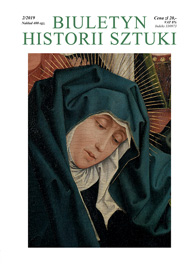Władysława Skoczylasa podróż do ZSRR
Władysław Skoczylas's Trip to the USSR
Author(s): Dariusz KonstantynówSubject(s): Visual Arts, Interwar Period (1920 - 1939), Sociology of Art, History of Art
Published by: Instytut Sztuki Polskiej Akademii Nauk
Keywords: Władysław Skoczylas; Trip to the USSR;
Summary/Abstract: With the Soviet-Polish Non-Aggression Pact having been signed on 25 July 1932, there began a period of ‘rapprochement’ between the two countries, this resulting in e.g. a visit of a group of six Polish artists to Moscow and Leningrad (23 Nov. - 7 Dec. 1933). The group included: Władysław Jarocki, Władysław Skoczylas, Tadeusz Pruszkowski, Xawery Dunikowski, Władysław Daszewski, and Mieczysław Treter. Following the group’s return, it was only Władysław Skoczylas who publicly spoke about his impressions from the trip. He was most promptly associated with the Polish-Soviet ‘rapprochement’ in fine arts at the time: he most frequently spoke about art and organization of artistic life in the Soviet union, he also actively participated in establishing relations with Soviet artists, and since he was a known and esteemed artist himself, also a President of the institute of Art Propaganda, board member of the Society for Promoting Polish Art Abroad, and an active columnist affiliated with ‘Gazeta Polska’, an unofficial organ of the Polish government, his words resounded widely. The paper attempts to reconstruct the course of the visit of the Polish delegation, to analyse the report presented by Władysław Skoczylas in ‘Gazeta Polska’, as well as to answer the question why what he saw in the artistic life of the USSR was by him considered to have been one of the ‘strongest’ impressions he had had in the recent time. The encounter with Soviet art as well as becoming acquainted with the conditions in which Soviet artists lived and worked must have been an important experience for Władysław Skoczylas...
Journal: Biuletyn Historii Sztuki
- Issue Year: 81/2019
- Issue No: 2
- Page Range: 275-328
- Page Count: 54
- Language: Polish

